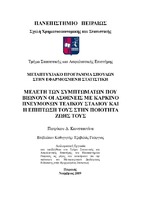Μελέτη των συμπτωμάτων που βιώνουν οι ασθενείς με καρκίνο πνευμόνων τελικού σταδίου και η επίπτωσή τους στην ποιότητα ζωής τους

Προβολή/
Λέξεις κλειδιά
Καρκίνος του πνεύμονα ; Ποιότητα ζωής ; QLQ-C30 ; ESAS-r ; CES-DΠερίληψη
Η παρούσα εργασία μελετά τα συμπτώματα που βιώνουν οι ασθενείς με καρκίνο του πνεύμονα τελικού σταδίου καθώς και την επίδραση τους στην ποιότητα ζωής των ασθενών. Πιο συγκεκριμένα, ασθενείς με προχωρημένο στάδιο καρκίνου του πνεύμονα συμπλήρωσαν δύο ερωτηματολόγια που αφορούν την ποιότητας ζωής (EORTC QLQ-C30, CES-D scale), ένα ερωτηματολόγιο για την εκτίμηση των συμπτωμάτων (ESAS-r) καθώς και ορισμένα δημογραφικά στοιχεία.
Στην εργασία συμμετείχαν 89 ασθενείς με καρκίνο του πνεύμονα σε προχωρημένο στάδιο, από τους οποίους 13 αφαιρέθηκαν λόγω μη έγκυρων ερωτηματολογίων. Στο δείγμα εφαρμόστηκαν κατάλληλοι παραμετρικοί και μη παραμετρικοί έλεγχοι, ο έλεγχος Χ2 του Pearson, μοντέλα απλής και πολλαπλής γραμμικής παλινδρόμησης και μοντέλα απλής και πολλαπλής λογιστικής παλινδρόμησης. Επιπλέον, υπολογίστηκε ο δείκτης alpha του Cronbach.
Τα κυριότερα συμπεράσματα που προέκυψαν από την εργασία, αφορούν την συσχέτιση των συμπτωμάτων που βιώνουν οι ασθενείς με την ποιότητα ζωής τους. Επιπλέον, μελετήθηκε ποιοι δημογραφικοί και κλινικοί παράγοντες επηρεάζουν την κάθε κλίμακα ποιότητας ζωής. Επίσης, βρέθηκε ότι η ύπαρξη υψηλής συμπτωματολογίας μειώνει την συνολική βαθμολογία του QLQ-C30 ενώ αυξάνει τη βαθμολογία του CES-D. Ακόμα, το αίσθημα του πόνου και το αίσθημα της κούρασης βρέθηκε ότι αποτελούν στατιστικά σημαντικούς προγνωστικούς παράγοντες του συνολικού score του QLQ-C30. Επιπλέον, το αίσθημα της κατάθλιψης, ο τύπος καρκίνου του πνεύμονα, το είδος της ασφάλισης καθώς και το είδος της θεραπείας βρέθηκαν ότι είναι στατιστικά σημαντικοί προγνωστικοί παράγοντες της συνολικής βαθμολογίας του CES-D ενώ βρέθηκε ότι, η κούραση αποτελεί σημαντικό προγνωστικό παράγοντα της χαμηλής ποιότητας ζωής/ κατάσταση υγείας, της χαμηλής φυσικής λειτουργικότητας, της χαμηλής συναισθηματικής λειτουργικότητας και της χαμηλής γνωστικής λειτουργικότητας. Η υπνηλία βρέθηκε ότι αποτελεί στατιστικά σημαντικό προγνωστικό παράγοντα της χαμηλής λειτουργικότητας ρόλων ενώ η χαμηλή κοινωνική λειτουργικότητα μπορεί να προβλεφθεί από την κούραση και από το αν ο ασθενής υποβάλλεται σε χημειοθεραπεία. Τέλος, για την πρόβλεψη ασθενών σε ρίσκο για κατάθλιψη στατιστικά σημαντικές μεταβλητές βρέθηκαν ότι είναι η κούραση και η απώλεια όρεξης.


